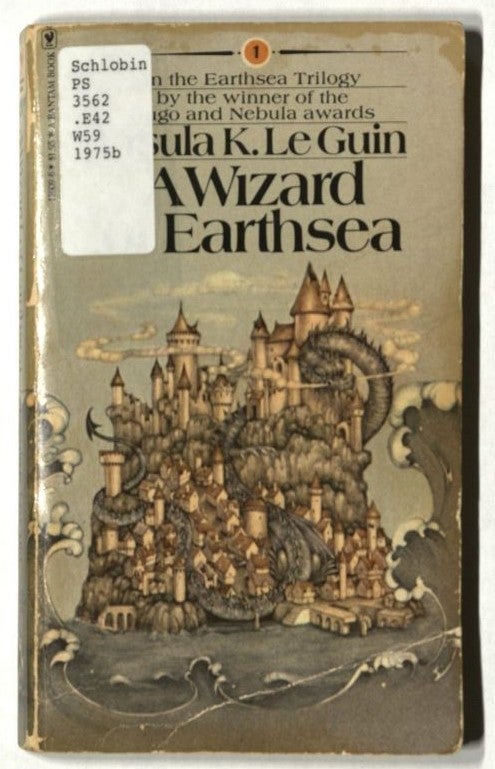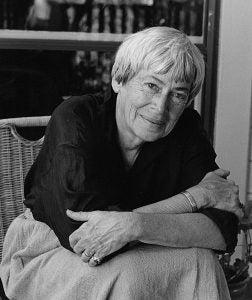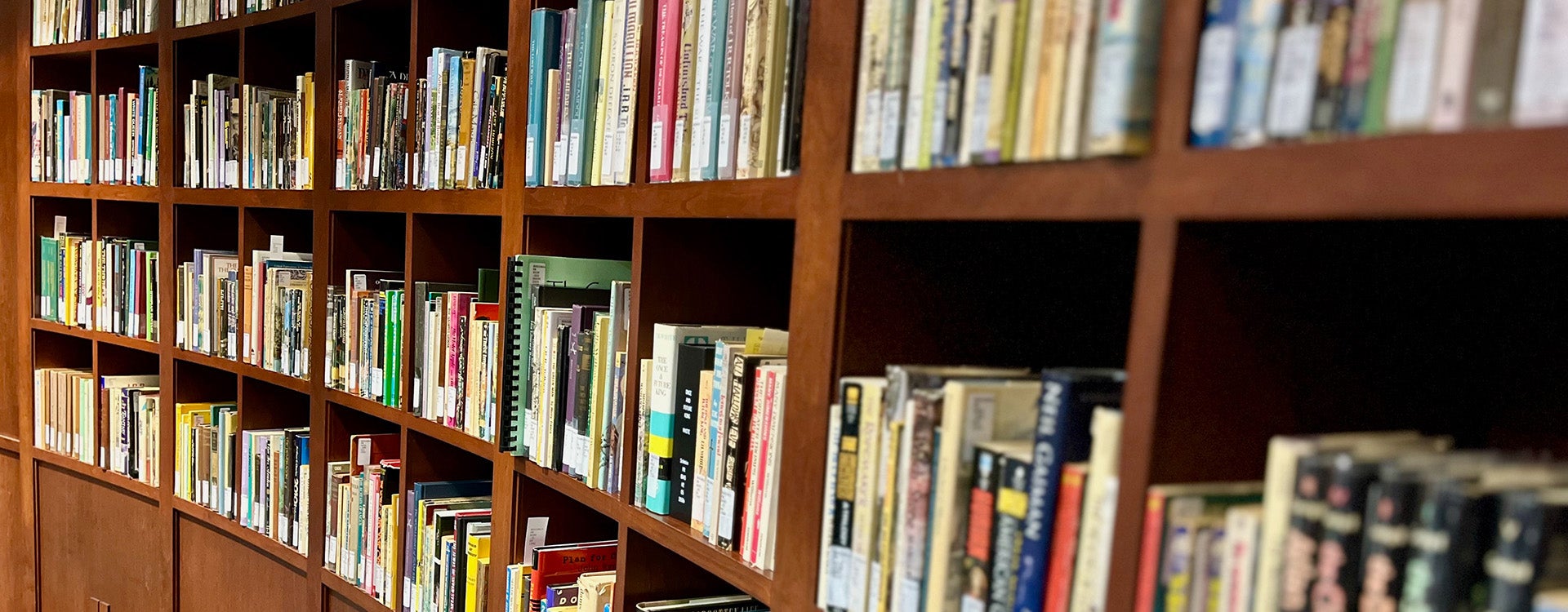Schlobin Selections #6 A Wizard of Earthsea by Ursula K. Le Guin
Schlobin Selections #6 A Wizard of Earthsea by Ursula K. Le Guin
Over the next several weeks, we will be highlighting a select number of titles and authors from the James H. and Virginia Schlobin Literature of the Fantastic Collection. Established in 2004 by East Carolina University English Professor Roger C. Schlobin, the James H. and Virginia Schlobin Literature of the Fantastic Collection provides scholarly materials to researchers and students interested in Science Fiction and Fantasy literature. The collection consists of over 3,700 individual books, mostly primary literature in the form of novels, and collected short narratives with some additional secondary literature and scholarly criticism related to the various genres that are represented. The James H. and Virginia Schlobin Literature of the Fantastic Collection also has a related manuscripts collection which consists of nearly 5 cubic feet of materials which can be accessed online.

A Wizard of Earthsea by Ursula K. Le Guin
Title: A Wizard of Earthsea
Author: Ursula K. Le Guin
Illustrated by Ruth Robbins
Publisher: Bantam Books
Publication Date: 1975
Page Count: 256
Call Number: PS3562.E42 W59 1975B
Originally published in 1968, Ursula K. Le Guin’s (1928-2018) A Wizard of Earthsea is the first book in the Earthsea series. Set on the fictional archipelago known as Earthsea, Le Guin’s work follows the story of Duny, a young boy from the fictional island of Gont who is found to possess the ability to use magic at a young age. After helping his fellow villagers fight off an attack from a group of raiders with his magic, Duny is taken as an apprentice by the powerful wizard named Ogion who not only works to teach young boys how to control and use his powers, but he also gives him his “true name,” christening the child Ged. After endangering himself by attempting to study on his own, Ogion sends the young boy off to enroll in a school for wizards located on a neighboring island.
Once at the school, Ged gains the attention of his teachers and fellow students with his magical abilities surpassing those of his peers. After getting into a confrontation with a fellow student at a school festival, Ged accidentally releases a powerful shadow creature during a duel that turns on him and attacks the boy, leaving his face permanently scarred. After recovering from his injuries, Ged is informed that the shadow creature is the remnants of an ancient evil that seeks to possess the powerful wizard and that it will continue to hunt and torment the child until it is able to do so. After completing his studies and receiving his wizard’s staff, Ged sets out to use his magic to help the residents of Earthsea, ultimately settling in the Ninety Isles where he protects the residents of the village from dragons. Still being terrorized by the shadow creature, Ged is forced to find a way to deal with both dangers as he knows he is unable to properly guard himself and the people against both dangerous forces. Ged is eventually to get the dragon to agree to leave the people of the village alone after correctly guessing the dragon’s name, thus gaining control over the being.
After securing the safety of the villagers, Ged sets out to defeat the shadow creature once and for all. After securing the stone of Terrenon, Ged returns to his home island of Gony and meets with his former teacher, Ogion. Once there, Ogion explains that to defeat the shadow creature, Ged must seek it out and confront it. Armed with this information, Ged sets out to confront the creature that has plagued him for so many years, discovering that now it is the creature that flees from Ged. After reuniting with a friend from his time in school, Ged forges a path eastward beyond the last charted lands to face off with the shadow creature one final time.
Upon its initial release, Le Guin’s A Wizard of Earthsea was considered by many to be children’s literature, thus it did not receive the attention and praise of the fantasy literature community. It was not until years after its initial release that scholars began criticizing the “children’s literature” classification that Le Guin’s work had been given. Instead, it was argued that her work, much like many of the other prominent authors of the time, could be enjoyed by children, young adults, and adult readers alike. Once Le Guin’s work did finally receive the attention it was warranted, the recognition and accolades for A Wizard of Earthsea shortly followed. In 1969, it won the Boston Globe-Horn Book Award as well as the Lewis Carroll Shelf Award in 1979. In 1987, Locus: The Magazine of The Science Fiction & Fantasy Field ranked A Wizard of Earthsea as third on its “All-Time Best Fantasy Novels” list. A 2014 list distributed by Pringle has Le Guin’s work ranked 39 out of 100 in its best of modern fantasy category.

Ursula K. Le Guin, August 1995. Photo by Marian Wood Kolisch
Along with the numerous accolades that Le Guin’s book has garnered over the years, its influence on later authors and titles is just as significant. Often compared to the works of authors such as J.R.R. Tolkien and L. Frank Baum, A Wizard Of Earthsea has inspired others to delve into stories that touch on young protagonists who are forced to come to grasp not only the limitations of their powers but also the dangers these powers can bring to themselves and those around them. Perhaps the most successful titles that took influence from Le. Guin and her writings are J.K. Rowling’s Harry Potter titles which also focused on a powerful young wizard who is enrolled in a school for magic and is forced to find the courage to face a dangerous enemy who is set on destruction. In a 2005 interview with The Guardian, Le Guin stated that she harbored no ill will against Rowling for her work but she wished that critics who were praising the Harry Potter story had realized that it was not an original idea.
Read previous entries from Schlobin Selections.
Sources:
- Craig, Amanda. “Classic of the Month: A Wizard of Earthsea by Ursula Le Guin.” The Guardian. Guardian News and Media, September 24, 2003. https://www.theguardian.com/books/2003/sep/24/buildingachildrenslibrary.booksforchildrenandteenagers.
- Jaggi, Maya. “The Magician.” The Guardian. Guardian News and Media, December 17, 2005. https://www.theguardian.com/books/2005/dec/17/booksforchildrenandteenagers.shopping.
- Kuznets, Lois R. “‘High Fantasy’ in America: A Study of Lloyd Alexander, Ursula Leguin, and Susan Cooper.” The Lion and the Unicorn 9, no. 1 (1985): 19–35. https://doi.org/10.1353/uni.0.0075.
